Edible Seeds
chia seeds:
Nutritional value and uses of chia seeds:
Nutrition Value: Chia seeds are tiny powerhouses packed with essential nutrients. Here’s a breakdown of their nutritional content per ounce (28 grams):
- Calories: 138
- Protein: 4.7 grams
- Total Fat: 8.7 grams (including heart-healthy omega-3 fatty acids)
- Carbohydrates: 12 grams (of which 83% is fiber)
- Fiber: 9.8 grams
- Magnesium: 95 mg
- Calcium: 178.9 mg
- Iron: 2.2 mg
- Potassium: 115 mg
- Vitamin C: 0.5 mg
- Vitamin A: 15.3 amu
- Sodium: 5 mg
- Chia seeds are also gluten-free and versatile in cooking due to their ability to absorb liquid and form a gel-like consistency12.
Health Benefits and Uses:
- Heart Health: Chia seeds are an excellent source of fiber, which can help reduce LDL cholesterol levels and support heart health.
- Digestive Health: Their high fiber content aids in healthy bowel function and may promote gut health.
- Energy Boost: Chia seeds can boost energy levels due to their nutrient density.
- Blood Pressure Regulation: The omega-3 fatty acids in chia seeds may help lower blood pressure.
- Blood Sugar Control: Chia seeds’ soluble fiber can help stabilize blood sugar levels.
- Weight Management: Their fiber content promotes satiety and may aid in weight loss.
- Antioxidants: Chia seeds contain antioxidants that protect against oxidative damage.
How to Use Chia Seeds:
- Soak them in water or juice to create a gel for puddings or drinks.
- Sprinkle them on cereal, oatmeal, yogurt, or salads.
- Use them as a thickening agent in sauces.
- Add them to baked goods.
- Experiment with chia seed pudding recipes.
Remember, start with smaller amounts if you’re new to chia seeds and gradually increase as your body adjusts to the extra dietary fiber. Enjoy the benefits of these tiny seeds in your meals!
Egusi Seeds:
nutrition value and uses of egusi seeds:
Nutrition Value:
Egusi seeds, also known as melon seeds, are botanically known as Citrullus colocynthis. These seeds are highly nutritious and versatile, popular in many African and Middle Eastern countries. Here’s a breakdown of their nutritional content:
- Protein: Egusi seeds are a rich source of protein, crucial for muscle repair and growth.
- Omega-6 Fatty Acids: Similar to most plant oils, egusi seeds mainly contain unsaturated fatty acids.
- Antioxidants: Egusi seed oil contains natural antioxidants like vitamin Eand ß-carotene.
- Minerals: Potassium and calcium are essential minerals present in egusi seeds, known to regulate blood pressure.
Health Benefits and Uses:
- Diabetes Prevention: Egusi seeds may help prevent diabetes by lowering HbA1Cand fasting blood glucose levels in diabetic patients. Additionally, egusi seed oil has shown blood sugar-lowering effects in mice with diabetes.
- Lipid Reduction: Elevated levels of lipids (such as triglycerides and LDL cholesterol) are risk factors for heart disease and diabetes. Ground egusi seeds can lower triglyceride and cholesterol levels in patients with high blood lipid levels.
- Bacterial Infection Prevention: Egusi seeds have antimicrobial properties and may help prevent bacterial infections caused by Escherichia coli, Pseudomonas aeruginosa, and Salmonella typhimurium.
Culinary Uses:
- West Africans grind egusi seeds before cooking them with leafy green vegetables, meat, palm oil, herbs, and seasonings to form a thick soup.
- Nigerians typically eat egusi with éba(a dough made from dried cassava), pounded yam, or fufu (another dough made from cassava).
Remember to incorporate these nutritious seeds into your meals for their health benefits!
Flax Seeds:
Nutrition value and Uses of Flax seeds:
Nutrition Value: Flax seeds (also known as linseeds) are small oil seeds packed with essential nutrients. Here’s a breakdown of their nutritional content per tablespoon (10 grams) of whole seeds:
- Calories: 55
- Water: 7%
- Protein: 1.9 grams
- Carbohydrates: 3 grams
- Sugar: 0.2 grams
- Fiber: 2.8 grams
- Fat: 4.3 grams (including heart-healthy omega-3 fatty acids)
- Magnesium: 9.8 mg
- Iron: 0.1 mg
- Calcium: 6.4 mg
- Potassium: 20 mg
- Sodium: 1 mg
Health Benefits and Uses:
- Heart Health: Flax seeds are a good plant-based source of omega-3 fatty acids, which may help improve cholesterol levels and reduce inflammation.
- Digestive Health: The high fiber content in flax seeds promotes regularity, prevents constipation, and supports gut health.
- Blood Sugar Control: Soluble fiber in flax seeds helps regulate blood sugar levels.
- Weight Management: Flax seeds’ fiber content promotes satiety and may aid in weight loss.
- Antioxidants: Flax seeds contain antioxidants that protect cells from damage.
Culinary Uses:
Ground Flax Seeds: Grinding flax seeds is the best way to unlock their health benefits. Add them to smoothies, yogurt, oatmeal, or baked goods.
Flaxseed Oil: Flaxseed oil is another option, rich in omega-3s. Use it in salad dressings or drizzle over dishes.
Remember to incorporate these nutritious seeds into your diet for a healthier you!
“Nutrition value” and “uses” of “Hemp seed”
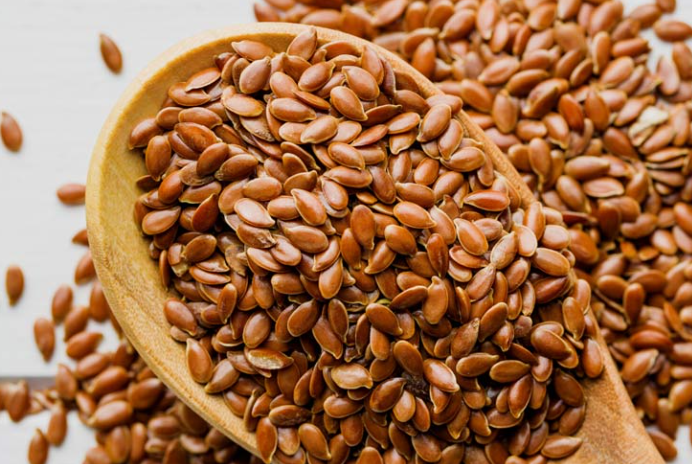
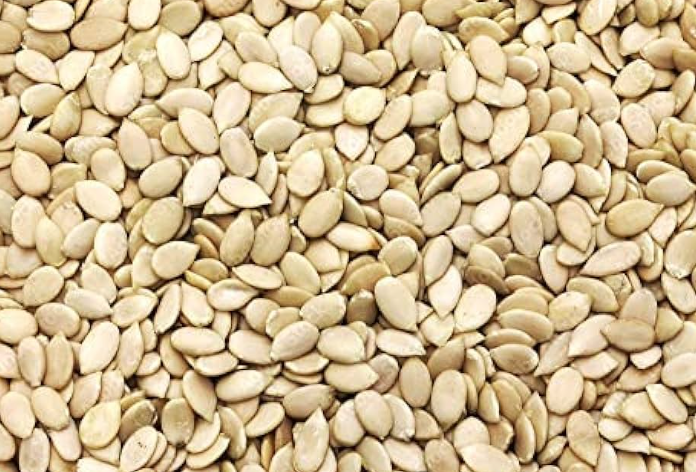
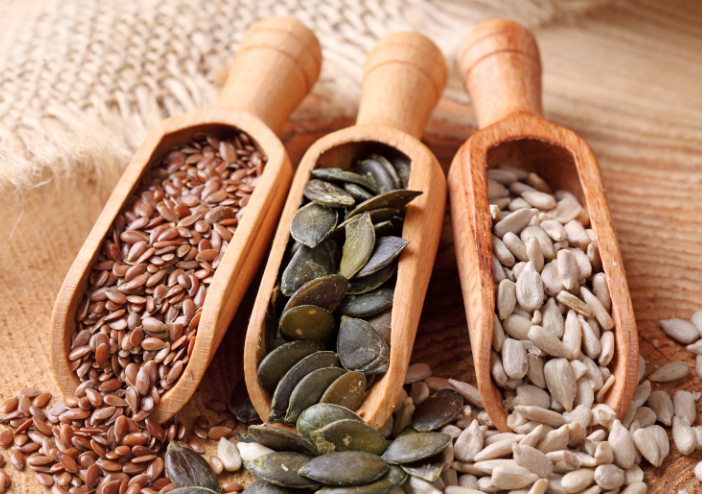
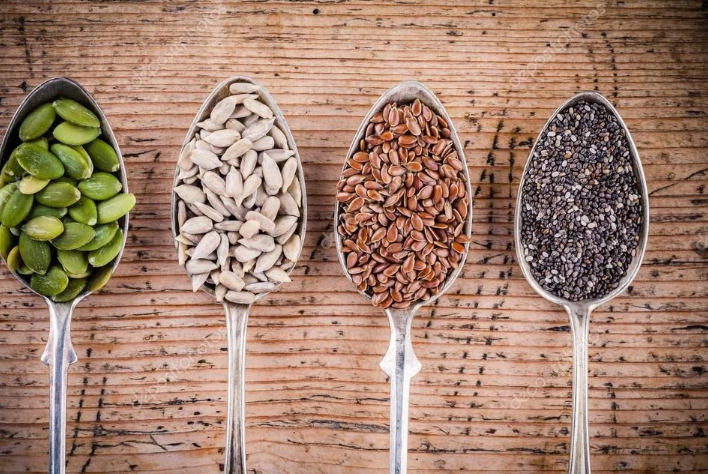
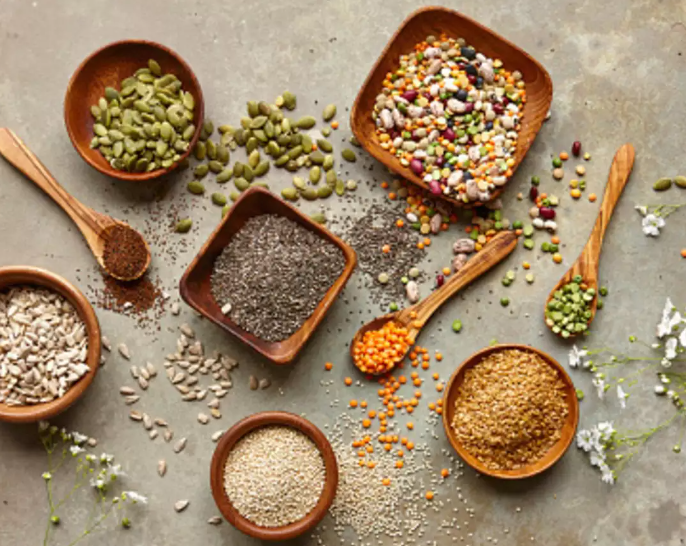
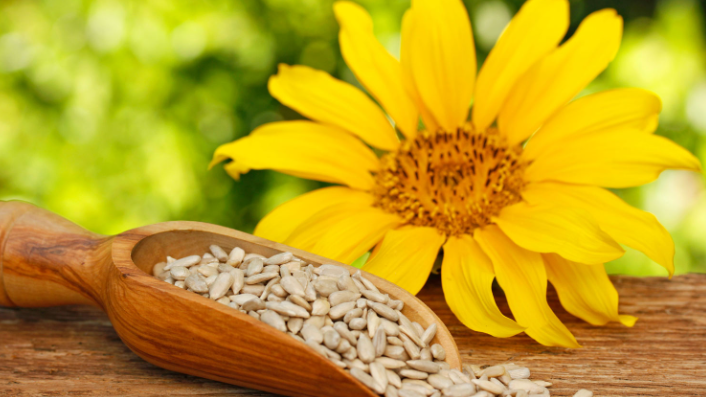
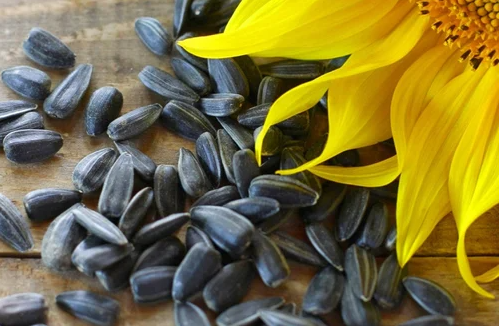
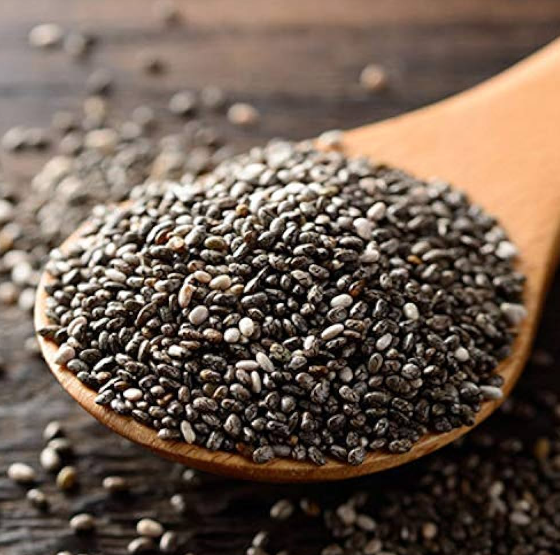
Hemp Seeds:
nutrition value and uses of hemp seeds:
Nutrition Value: Hemp seeds, also known as hemp hearts, are small but mighty when it comes to nutrients. Here’s a breakdown of their nutritional content per 30 grams (approximately 3 tablespoons) of seeds:
- Protein: Hemp seeds are a complete source of protein, providing all nine essential amino acids. In fact, they contain almost as much protein as soybeans. Amino acids are the building blocks for all proteins, and hemp seeds are especially rich in an amino acid called arginine, which benefits heart health.
- Unsaturated Fats: Hemp seeds are a great source of essential fatty acids, including alpha-linolenic acid (ALA), which is an omega-3. These fatty acids are crucial for long-term health. Hemp seeds help promote a balance between omega-3s and omega-6s, which is essential for overall well-being. Additionally, hemp seeds are low in saturated fats and contain no trans fats.
- Fiber: Even without the outer hull (shell), hemp seeds are a good source of fiber. Three tablespoons of hemp seeds provide approximately 2 grams of fiber. Adequate fiber intake supports digestive health and may help lower cholesterol levels.
Health Benefits and Uses:
- Heart Health: Hemp seeds’ amino acid profile and omega-3 content contribute to heart health. They may help reduce the risk of heart disease and improve overall cardiovascular function.
- Skin and Hair: The healthy fats in hemp seeds benefit skin health by promoting moisture retention and reducing inflammation. They may also support hair growth and strength.
- Brain Function: Hemp seeds contain antioxidants and omega-3s, which protect brain cells and support cognitive function.
- Digestive Health: The fiber in hemp seeds aids digestion and helps prevent constipation.
- Reducing PMS Symptoms: Hemp seeds’ linolenic acids may help alleviate symptoms associated with premenstrual syndrome (PMS).
Culinary Uses:
- Sprinkle: Add hemp seeds to salads, yogurt, oatmeal, or smoothie bowls.
- Baking: Incorporate them into baked goods like muffins, cookies, or bread.
- Smoothies: Blend hemp seeds into your favorite smoothie for an extra boost of nutrition.
Remember to include these nutritious seeds in your diet for their health benefits!
Basil seed: /Sabja / Tukmaria
Nutrition Value:
Basil seeds are tiny black seeds that come from sweet basil (Ocimum basilicum). Despite their small size, they pack a nutritional punch:
- Minerals: Just 1 tablespoon (13 grams)of basil seeds supplies 15% of the Reference Daily Intake (RDI) for calcium and 10% of the RDI for magnesium and iron. These minerals are essential for bone health, muscle function, and red blood cell production.
- Fiber: Basil seeds are high in fiber, particularly soluble fiber like pectin. Here’s how the fiber in basil seeds benefits your health:
- Helps you meet your daily fiber quota (25% of the RDI in just 1 tablespoon).
- May support gut health by nourishing beneficial gut bacteria.
- May help you feel full and delay stomach emptying.
- May aid blood sugar control and improve cholesterol levels
- Culinary Uses:
- Hydration: Basil seeds swell up when soaked in water, forming a gel-like texture. They are often used in refreshing drinkslike falooda.
- Smoothies and Beverages: Add soaked basil seeds to smoothies, fruit juices, or herbal teas.
- Desserts: Sprinkle them on puddings, ice creams, or fruit salads.
- Chia Seed Substitute: Basil seeds can be used as a plant-based alternative to chia seeds in recipes.
Remember to incorporate these nutritious seeds into your diet for their health benefits!
Jackfruit Seed:
nutrition value and uses of jackfruit seeds:
Nutrition Value:
Jackfruit seeds are not only edible but also highly nutritious. Compared to other tropical fruit seeds, jackfruit seeds pack many important nutrients. Here’s what you’ll find in a 1-ounce (28-gram) serving of jackfruit seeds:
- Calories: 53
- Carbohydrates: 11 grams
- Protein: 2 grams
- Fat: 0 grams
- Fiber: 0.5 grams
- Riboflavin (Vitamin B2): 8% of the Reference Daily Intake (RDI)
- Thiamine (Vitamin B1): 7% of RDI
- Magnesium: 5% of RDI
- Phosphorus: 4% of RDI
- Additionally, jackfruit seeds contain high concentrations of two B vitamins — thiamineand riboflavin — which play essential roles in providing energy and supporting overall health.
Health Benefits and Uses:
- Antimicrobial Effects: Jackfruit seeds have been traditionally used to relieve diarrhea. Studies suggest that they may have antibacterial effects. The surface of jackfruit seeds contains small particles that act as antibacterial agents, potentially preventing food-borne illnesses.
- Anticancer Properties: Jackfruit seeds are rich in antioxidants, including flavonoids, saponins, and phenolics. These plant compounds may help fight inflammation, enhance the immune system, and repair DNA damage. However, more research is needed to fully understand their anticancer potential.
- Traditional Uses: In Traditional Chinese medicine, jackfruit seeds have been used as an aphrodisiacand for treating digestive issues.
Remember to explore ways to incorporate these nutritious seeds into your diet for their health benefits!
Pumpkin seed:
nutrition value and uses of pumpkin seeds:
Nutrition Value:
Pumpkin seeds are a satisfying, calorie-dense snack with several vitamins and minerals to offer. Despite their small size, they provide essential nutrients:
- Protein: A single serving of pumpkin seeds provides 3 grams of protein, making them a good source of this nutrient.
- Magnesium: Pumpkin seeds are rich in magnesium, which plays a crucial role in various bodily functions.
- Zinc: They also contain zinc, important for immune function and wound healing.
- Iron: Pumpkin seeds provide a small amount of iron, essential for red blood cell production.
- Fiber: With 2 grams of fiberper serving, they support digestive health.
Health Benefits and Uses:
- Heart Health: Pumpkin seeds’ healthy monounsaturated and polyunsaturated fats contribute to heart health.
- Sleep Improvement: The seeds contain tryptophan, which may promote better sleep.
- Menopausal Symptoms: Pumpkin seeds may ease menopausal symptoms due to their phytoestrogen
- Digestion: Their fiber aids digestion and supports gut health.
- Cell Growth and Repair: Pumpkin seeds provide nutrients necessary for cell growth and repair.
Culinary Uses:
- Snacking: Enjoy roasted pumpkin seeds as a snack.
- Salads and Baking: Sprinkle them on salads or incorporate them into baked goods.
- Trail Mix: Add pumpkin seeds to your favorite trail mix.
Remember to include these nutritious seeds in your diet for their health benefits!
Watermelon seed:
nutrition value and uses of watermelon seeds:
Nutrition Value:
Watermelon seeds are relatively low in calories yet high in nutrients. A 1-ounce (28 gram) serving of watermelon seed kernels includes many essential nutrients:
- Protein: Watermelon seeds are a good source of protein, providing about 5 grams per ounce.
- Phosphorus: They contain phosphorus, which is important for bone health and energy metabolism.
- Magnesium: Watermelon seeds are rich in magnesium, supporting various bodily functions.
- Iron: These seeds provide a small amount of iron, essential for red blood cell production.
- Zinc: Watermelon seeds are a source of zinc, which boosts immunity and supports digestion.
- Good Fats: They contain both monounsaturated and polyunsaturated fatty acids, which are heart-healthy.
Culinary Uses:
- Roasted Snack: Roast watermelon seeds with a pinch of salt and olive oil for a tasty and nutritious snack.
- Sprouting: Sprout watermelon seeds for added nutrition.
- Raw: Eat them raw as a crunchy snack or sprinkle them on smoothies and salads.
- Ground into Powder: Grind watermelon seeds into a powder and add it to dishes.
Remember to incorporate these nutritious seeds into your diet for their health benefits!
Alive seeds:
Alive seeds, also known as halim seeds or garden cress seeds, are small but mighty when it comes to nutrition. Let’s explore their benefits and uses:
Nutrition Value:
- Protein: Alive seeds are regarded as a superfooddue to their dense protein content. They are beneficial for fitness enthusiasts aiming to build muscle mass.
- Iron: Just 1 tablespoonof alive seeds offers a whopping 12 mg of iron. Iron is essential for red blood cell production and overall health.
- Fiber: These seeds are rich in fiber, aiding digestion and treating stomach-related issues like constipation, bloating, and indigestion.
- Zinc: Alive seeds contain zinc, which boosts immunity and supports digestion.
- Galactagogue Properties: For nursing mothers, alive seeds are advantageous due to their high protein, iron, and galactagogue characteristics. Galactagogues help boost breast milk production.
Health Benefits and Uses:
- Menstrual Cycle Regulation: Alive seeds contain phytochemicals that resemble the hormone estrogen. They can help control irregular periods and regulate hormonal cycles.
- Weight Loss: The protein and fiber in alive seeds increase satiety, prevent hunger cravings, and aid in weight reduction.
- Breast Milk Production: Nursing mothers can benefit from alive seeds due to their nutritional properties.
- Immunity Boost: Packed with flavonoids (antioxidants), vitamins A, C, and E, alive seeds enhance the body’s immunity.
Remember to include these nutritious seeds in your diet for overall health and well-being!
Sweet Basil Seed
“Nutrition value” and “uses” of “Sweet Basil seed”
(also known as sabja seeds or tukmaria seeds):
Nutrition Value:
Sweet basil seeds are tiny black seeds that come from the sweet basil plant (Ocimum basilicum). Despite their small size, they pack a nutritional punch:
- Minerals: Just 1 tablespoon (13 grams)of sweet basil seeds supplies 15% of the Reference Daily Intake (RDI) for calcium and 10% of the RDI for magnesium and iron. Calcium and magnesium are essential for bone health and muscle function, while iron is vital for red blood cell production.
- Fiber: Sweet basil seeds are high in fiber, particularly soluble fiber like pectin. Here’s how the fiber in sweet basil seeds benefits your health:
- Helps you meet your daily fiber quota. Just 1 tablespoon supplies 7 grams of fiber— 25% of the RDI. Many people don’t get enough fiber in their diet.
- May support gut health. Test-tube studies suggest that pectin has prebiotic benefits, nourishing beneficial gut bacteria, including anti-inflammatory strains.
- May help you feel full. Pectin may delay stomach emptying and increase hormones that promote a sense of fullness.
- May aid blood sugar control. In a study, people with type 2 diabetes who consumed sweet basil seeds experienced lower post-meal blood sugar levels.
Culinary Uses:
- Refreshing Drinks: Sweet basil seeds swell up when soaked in water, forming a gel-like texture. They are often used in refreshing drinkslike falooda.
- Smoothies and Beverages: Add soaked sweet basil seeds to smoothies, fruit juices, or herbal teas.
- Desserts: Sprinkle them on puddings, ice creams, or fruit salads.
- Chia Seed Substitute: Sweet basil seeds can be used as a plant-based alternative to chia seeds in recipes.
Remember to incorporate these nutritious seeds into your diet for their health benefits!
Sabja Seed:
Sabja seeds is also known as sweet basil seeds or tukmaria seeds, are tiny black seeds derived from the sweet basil plant (Ocimum basilicum). These seeds offer several health benefits and are commonly used in traditional medicine. Let’s explore their nutritional value and uses:
Nutrition Value:
- Minerals: Just 1 tablespoon (13 grams)of sabja seeds provides 15% of the Reference Daily Intake (RDI) for calcium and 10% of the RDI for magnesium and iron. Calcium and magnesium are crucial for bone health and muscle function, while iron is essential for red blood cell production.
- Fiber: Sabja seeds are high in fiber, particularly soluble fiber like pectin. Here’s how the fiber in sabja seeds benefits your health:
- Helps you meet your daily fiber quota. One tablespoon supplies 7 grams of fiber, which is 25% of the RDI. Many people don’t consume enough fiber.
- Supports gut health. Test-tube studies suggest that pectin has prebiotic benefits, nourishing beneficial gut bacteria, including anti-inflammatory strains.
- May help you feel full. Pectin delays stomach emptying and increases hormones that promote a sense of fullness.
- May aid blood sugar control. People with type 2 diabetes who consumed sabja seeds experienced lower post-meal blood sugar levels.
Culinary Uses:
- Refreshing Drinks: When soaked in water, sabja seeds swell up and form a gel-like texture. They are commonly used in refreshing drinkslike falooda.
- Smoothies and Beverages: Add soaked sabja seeds to smoothies, fruit juices, or herbal teas.
- Desserts: Sprinkle them on puddings, ice creams, or fruit salads.
- Chia Seed Substitute: Sabja seeds can be used as a plant-based alternative to chia seeds in recipes.
Remember to incorporate these nutritious seeds into your diet for their health benefits!
Sunflower seed:
nutrition value and uses of sunflower seeds:
Nutrition Value:
Sunflower seeds are packed with essential nutrients and beneficial compounds. Here’s a breakdown of their nutritional content per 1 ounce (30 grams or 1/4 cup) of shelled, dry-roasted sunflower seeds:
- Calories: 163
- Total Fat: 14 grams
- Saturated Fat: 1.5 grams
- Polyunsaturated Fat: 9.2 grams
- Monounsaturated Fat: 2.7 grams
- Protein: 5.5 grams
- Carbohydrates: 6.5 grams
- Fiber: 3 grams
- Vitamin E: 37% of the Reference Daily Intake (RDI)
- Niacin (Vitamin B3): 10% of the RDI
- Vitamin B6: 11% of the RDI
- Folate (Vitamin B9): 17% of the RDI
- Pantothenic Acid (Vitamin B5): 20% of the RDI
- Iron: 6% of the RDI
- Magnesium: 9% of the RDI
- Zinc: 10% of the RDI
- Copper: 26% of the RDI
- Manganese: 30% of the RDI
- Selenium: 32% of the RDI
Sunflower seeds are especially high in vitamin E and selenium, both of which function as antioxidants to protect your body’s cells against free radical damage. These antioxidants play a role in preventing chronic diseases. Additionally, sunflower seeds contain beneficial plant compounds like phenolic acids and flavonoids, which also act as antioxidants. When sprouted, sunflower seeds’ plant compounds increase, and sprouting reduces factors that can interfere with mineral absorption
Health Benefits:
- Heart Health: Sunflower seeds may help lower blood pressure, cholesterol, and blood sugar due to their vitamin E, magnesium, protein, and linoleic fatty acids.
- Antioxidant Protection: The vitamin E and selenium in sunflower seeds protect your cells against oxidative damage.
- Chronic Disease Prevention: Their beneficial plant compounds contribute to reducing the risk of chronic diseases.
- Bone and Skin Health: Sunflower seeds’ minerals, including copper and manganese, support healthy bones and skin.
Culinary Uses:
- Snacking: Sunflower seeds are popular for snacking straight from the bag.
- Trail Mix: Add them to trail mix for an energy-boosting snack.
- Baking: Incorporate sunflower seeds into multi-grain bread or nutrition bars.
- Roasting: Roast them to enhance their flavor.
Remember to include these nutritious seeds in your diet for their health benefits!
Lotus Seed (Makhana)
Lotus seeds, also known as makhana, are small but mighty when it comes to nutrition. Let’s dive into their benefits and uses:
Nutrition Value:
- Protein: Makhana is an excellent source of protein, making it a great addition to a healthy diet.
- Antioxidants: Rich in antioxidants like gallic acid, chlorogenic acid, and epicatechin, makhana helps protect your cells from oxidative damage.
- Blood Sugar Management: Some studies suggest that makhana may help regulate blood sugar levels.
- Weight Loss: High in protein and fiber, makhana can aid in weight loss.
Culinary Uses:
- Snacking: Enjoy roasted makhana as a crunchy snack.
- Trail Mix: Add them to your favorite trail mix.
- Baking: Incorporate makhana into baked goods.
Remember to include these nutritious seeds in your diet for their health benefits!
Nigella Seeds
Nigella seeds, also known as black cumin or black seeds, are small but potent seeds with a rich history of use in traditional medicine. Let’s explore their nutritional value and various uses:
Nutrition Value:
- Antioxidants: Nigella seeds are packed with antioxidants, including compounds like thymoquinone, carvacrol, t-anethole, and 4-terpineol. These antioxidants help neutralize harmful free radicals and protect against oxidative damage to cells.
- Cholesterol Management: Nigella seeds have been shown to effectively lower both total and “bad” LDL cholesterol levels. They may also increase “good” HDL cholesterol.
- Potential Cancer-Fighting Properties: Test-tube studies suggest that nigella seeds and their active compound, thymoquinone, may have anti-cancer effects.
Culinary Uses:
- Nigella seeds are used in various cuisines for their distinct flavor. Here are some ways to incorporate them:
- Spices: Add them to curries, bread, and stir-fried dishes.
- Topical Application: Nigella seed oil or paste can be applied topically to treat skin conditions, inflammation, or pain.
- Internal Consumption: Nigella seed powder, capsules, or extracts are recommended for internal use to prevent or treat inflammation and chronic diseases.
Remember to explore these flavorful seeds and enjoy their potential health benefits!
Poppy Seed:
nutrition value and uses of poppy seeds:
Nutrition Value:
Poppy seeds are small, flavorful seeds derived from the poppy plant (Papaver somniferum). Despite their tiny size, they offer several health benefits:
- Rich in Nutrients: One tablespoon (about 9 grams) of poppy seeds provides:
- Calories: 46
- Protein: 1.6 grams
- Fat: 3.7 grams (including healthy fats)
- Carbohydrates: 2.5 grams
- Fiber: 1.7 grams
- Manganese: 26% of the Daily Value (DV)
- Copper: 16% of the DV
- Calcium: 10% of the DV
- Magnesium: 7% of the DV
- Phosphorus: 6% of the DV
- Zinc: 6% of the DV
- Thiamine (Vitamin B1): 6% of the DV
- Iron: 5% of the DV
- Antioxidants: Poppy seeds contain polyphenols, which act as antioxidants and may lower the risk of heart disease.
Culinary Uses:
- Baking: Poppy seeds are commonly used in baked goods like muffins, bagels, and pastries.
- Salad Toppings: Sprinkle them on salads for added crunch and flavor.
- Curries and Sauces: Poppy seeds are used in various savory dishes and sauces.
Remember to incorporate these nutritious seeds into your diet for their health benefits!
Pomegranate Seeds:
nutrition value and uses of pomegranate seeds
Nutrition Value: Pomegranate seeds, also known as arils, are little ruby-red bursts of sweet and tart deliciousness that pack a serious punch of health benefits. Here’s the nutrition for the arils in one average pomegranate (about 87 grams):
- Calories: 72.2
- Protein: 1.5 grams
- Fat: 0.1 grams
- Carbohydrates: 16 grams
- Fiber: 3.5 grams
- Vitamin C: 8.9 milligrams (32% of the Daily Value)
- Folate: 27% of the Daily Value
- Magnesium: 10.4 milligrams (8% of the Daily Value)
- Potassium: 205 milligrams (13% of the Daily Value)
Health Benefits:
- Antioxidants: Pomegranate seeds are rich in antioxidants, including compounds like punicalagins, anthocyanins, and hydrolyzable tannins. These antioxidants protect your cells from free radical damage.
- Inflammation Reduction: Pomegranate seeds may help prevent chronic inflammation associated with conditions like heart disease and diabetes.
- Potential Anticancer Properties: Research suggests that compounds in pomegranate have anticancer effects, especially for prostate cancer.
Culinary Uses:
- Snacking: Enjoy pomegranate seeds as a sweet and tangy snack.
- Salads: Sprinkle them on salads for added flavor and crunch.
- Smoothies and Yogurt: Add them to smoothies or mix them into yogurt.
- Garnish: Use pomegranate seeds as a colorful garnish for desserts or savory dishes.
Remember to include these nutritious seeds in your diet for their health benefits!
Sesamum Seeds
Sesame seeds, also known as sesamum seeds, are tiny, oil-rich seeds that grow in pods on the Sesamum indicum plant. These seeds have been used in folk medicine for thousands of years and are rich in protein, vitamins, minerals, and antioxidants. Let’s explore their nutritional value and various uses:
Nutrition Value:
- Fiber: Three tablespoons (30 grams) of unhulled sesame seeds provide 5 grams of fiber, which is 12% of the Reference Daily Intake (RDI). Fiber is essential for digestive health and may reduce the risk of heart disease, certain cancers, obesity, and type 2 diabetes.
- Lower Cholesterol and Triglycerides: Sesame seeds contain lignansand phytosterols, which can help lower cholesterol levels. They are also known to prevent high blood pressure.
- Plant Protein: Sesame seeds supply 5 grams of proteinper serving. Opt for hulled, roasted sesame seeds to maximize protein availability.
Culinary Uses:
- Snacking: Enjoy roasted sesame seeds as a crunchy snack.
- Salads: Sprinkle them on salads for added flavor and texture.
- Smoothies and Yogurt: Add sesame seeds to smoothies or mix them into yogurt.
- Baking and Cooking: Incorporate sesame seeds into baked goods, bread, and savory dishes.
Remember to include these nutritious seeds in your diet for their health benefits
Carom Seeds (Ajwain):
Carom seeds, also known as ajwain, are small but mighty when it comes to nutrition. Let’s explore their benefits and uses:
Nutrition Value:
- Antibacterial and Antifungal Properties: Carom seeds contain thymoland carvacrol, which inhibit the growth of bacteria and fungi. They may combat harmful strains like Escherichia coli (E. coli) and Salmonella.
- Cholesterol Improvement: Animal studies suggest that carom seeds may lower cholesterol and triglyceride levels, both risk factors for heart disease.
- Digestive Aid: Carom seeds are commonly used to relieve indigestion and bloating.
- Traditional Medicine: They have been used in traditional Indian medicine practices for various health benefits.
Culinary Uses:
- Spices: Add them to curries, bread, and stir-fried dishes.
- Tea or Water: Chew them directly or add them to water or tea for health benefits.
- Insect Repellent: Carom seeds are also used as an insect repellent.
Remember to incorporate these nutritious seeds into your diet for their health benefits!
Coriander Seed:
“Nutrition value” and “uses” of “Coriander seed”
Coriander seeds, also known as coriander, are flavorful and aromatic seeds derived from the Coriandrum sativum plant. These seeds are widely used in cooking and have several health benefits. Let’s explore their nutritional value and various uses:
Nutrition Value:
- Antioxidants: Coriander seeds contain antioxidants like terpinene, quercetin, and tocopherols. These compounds have been shown to fight inflammation and protect against cellular damage caused by free radicals.
- Blood Sugar Regulation: Animal studies suggest that coriander seeds may help lower blood sugar levels by promoting enzyme activity that removes sugar from the blood.
- Heart Health: Some studies indicate that coriander seeds may lower heart disease risk factors, including high blood pressure and LDL (bad) cholesterol levels.
Culinary Uses:
- Spices: Add coriander seeds to curries, soups, and stews for flavor.
- Baking: Incorporate them into baked goods like bread and pastries.
- Tea Infusion: Brew coriander seed tea for digestive benefits.
- Pickling: Use coriander seeds in pickling recipes.
Remember to include these nutritious seeds in your diet for their health benefits!
Fenugreek seeds:
Fenugreek seeds, also known as methi seeds, are small but mighty when it comes to nutrition. Let’s explore their benefits and uses:
Nutrition Value:
- Antioxidants: Fenugreek seeds contain compounds like terpinene, quercetin, and tocopherols, which act as antioxidants. These help protect your cells from oxidative damage caused by free radicals.
- Blood Sugar Regulation: Research suggests that fenugreek may help lower blood sugar levels by promoting enzyme activity that removes sugar from the blood.
- Heart Health: Some studies indicate that fenugreek seeds may lower heart disease risk factors, including high blood pressure and LDL (bad) cholesterol levels.
Culinary Uses:
- Spices: Add fenugreek seeds to curries, soups, and stews for flavor.
- Baking: Incorporate them into baked goods like bread and pastries.
- Tea Infusion: Brew fenugreek seed tea for digestive benefits.
- Pickling: Use fenugreek seeds in pickling recipes.
Remember to include these nutritious seeds in your diet for their health benefits!
Saflower Seed:
“Nutrition value” and “uses” of “Saflower seed”
Safflower seeds, scientifically known as Carthamus tinctorius, offer both culinary and potential health benefits. Let’s explore their nutritional value and uses:
Nutrition Value:
- Antioxidants: Safflower seeds contain flavonoidslike safflower yellow, which have antioxidant and anti-inflammatory properties.
- Heart Health: High oleic safflower oil, rich in monounsaturated fatty acids, can help lower LDL cholesterolwhen used in place of saturated fat. This may reduce the risk of heart disease.
- Blood Flow Improvement: Safflower seeds are traditionally used to improve blood circulation. Some studies suggest they help reduce hypertension and enhance blood flow.
Culinary Uses:
- Safflower Oil: Safflower oil, made from the seeds, is commonly used for cooking due to its high smoking point. It has a mild flavor and is available in most supermarkets.
- Traditional Medicine: Flowers and seeds of the safflower plant have been used in Chinese and Iranian traditional medicine for centuries.
Remember to incorporate these nutritious seeds into your diet for their potential health benefits!
Certainly! Let’s explore the nutrition value and various uses of Sesbania seeds:
